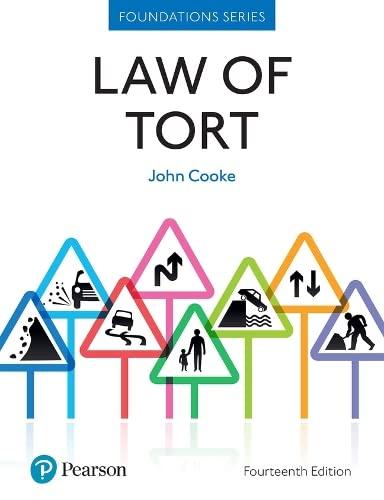Question
A state legislature enacted a statute that required any motorcycle operator or passenger on the state's highways to wear a protective helmet. Jim Alderman, a
A state legislature enacted a statute that required any motorcycle operator or passenger on the state's highways to wear a protective helmet. Jim Alderman, a licensed motorcycle operator, sued the state to block enforcement of the law. Alderman asserted that the statute violated the equal protection clause because it placed requirements on motorcyclists that were not imposed on other motorists. Using the information presented in the chapter, answer the following questions.
1. Why does this statute raise equal protection issues instead of substantive due process concerns?
2. Which level of scrutiny or test would apply to this situation? Why?
3. Under this standard or test, is the helmet statute constitutional? Why or why not
1-6c.Privacy Rights
The U.S. Constitution does not explicitly mention a right to privacy. In a 1928 Supreme Court case,Olmstead v. United States,*Justice Louis Brandeis stated in his dissent that the right to privacy is "the most comprehensive of rights and the right most valued by civilized men." The majority of the justices at that time, however, did not agree with Brandeis.
It was not until the 1960s that a majority on the Supreme Court endorsed the view that the Constitution protects individual privacy rights. In a landmark 1965 case,Griswold v. Connecticut,*the Supreme Court invalidated a Connecticut law that effectively prohibited the use of contraceptives on the ground that it violated the right to privacy. The Supreme Court held that a constitutional right to privacy was implied by the First, Third, Fourth, Fifth, and Ninth Amendments.
Today, privacy rights receive protection under various federal statutes as well as the U.S. Constitution. State constitutions and statutes also secure individuals' privacy rights, often to a significant degree. In addition, privacy rights are protected to an extent under tort law, consumer law, and employment law.
Federal Privacy Legislation
"There was, of course, no way of knowing whether you were being watched at any given moment."
GeorgeOrwell1903-1950 (English author, from his famous novel 1984)
Congress has enacted a number of statutes that protect the privacy of individuals in various areas of concern. Most of these statutes deal with personal information collected by governments or private businesses. For instance, the Freedom of Information Act allows any person to request copies of any information on her or him contained in federal government files. The Privacy Act also gives persons the right to access such information. These and other major federal laws protecting privacy rights are listed and briefly described inExhibit 1-2.
Exhibit
1-2.
Federal Legislation Relating to Privacy
TITLE OF ACTPROVISIONS CONCERNING PRIVACYFreedom of Information Act (1966)Provides that individuals have a right to access information about them collected in government files.Family Educational Rights and Privacy Act (1974)Limits access to computer-stored records of education-related evaluations and grades in private and public colleges and universities.Privacy Act (1974)Protects the privacy of individuals about whom the federal government has information. Regulates agencies' use and disclosure of data, and gives individuals access to and a means to correct inaccuracies.Electronic Communications Privacy Act (1986)Prohibits the interception of information communicated by electronic means.Driver's Privacy Protection Act (1994)Prevents states from disclosing or selling a driver's personal information without the driver's consent.Health Insurance Portability and Accountability Act (1996)Requires health-care providers and health-care plans to inform patients of their privacy rights and of how their personal medical information may be used. States that medical records may not be used for purposes unrelated to health care or disclosed without permission.Financial Services Modernization Act (Gramm-Leach-Bliley Act) (1999)Prohibits the disclosure of nonpublic personal information about a consumer to an unaffiliated third party unless strict disclosure and opt-out requirements are met.
The USA Patriot Act
The USA Patriot Act was passed by Congress in the wake of the terrorist attacks of September 11, 2001, and then reauthorized twice.*The Patriot Act has given government officials increased authority to monitor Internet activities (such as e-mail and website visits) and to gain access to personal financial information and student information. Law enforcement officials can track the telephone and e-mail communications of one party to find out the identity of the other party or parties. To gain access to these communications, the government must certify that the information likely to be obtained is relevant to an ongoing criminal investigation, but it does not need to provide proof of any wrongdoing. Privacy advocates argue that the Patriot Act adversely affects the constitutional rights of all Americans, and it has been widely criticized.
Step by Step Solution
There are 3 Steps involved in it
Step: 1

Get Instant Access to Expert-Tailored Solutions
See step-by-step solutions with expert insights and AI powered tools for academic success
Step: 2

Step: 3

Ace Your Homework with AI
Get the answers you need in no time with our AI-driven, step-by-step assistance
Get Started


